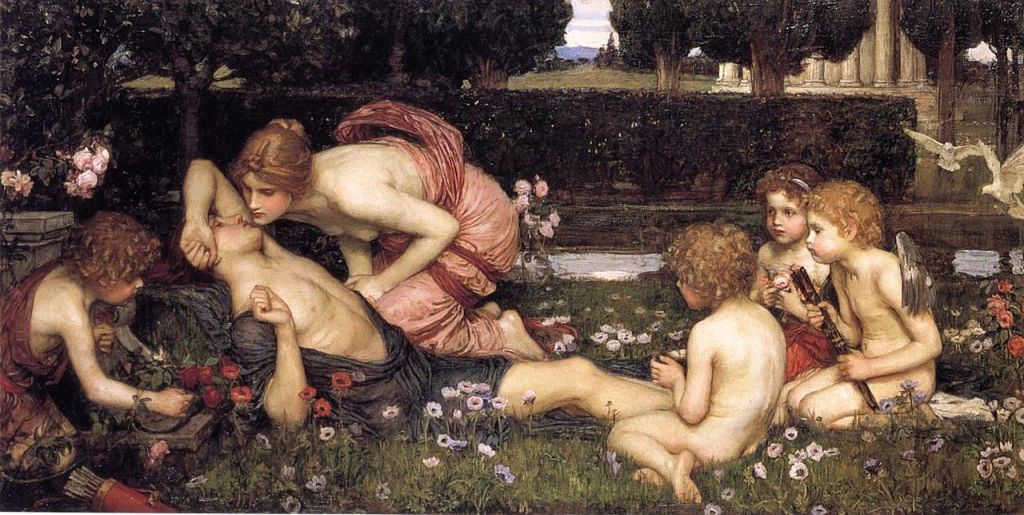
- Origin: Greek
- Meaning: “giving to God.”
Both come from the Greek, θεός (theos) meaning “god” and δόσις (dosis) meaning “giving.” Both the male and female form were borne by several Christian saints and Medieval rulers. In the English-speaking world, a notable bearer was Theodosia Alston Burr (1783-1813), the daughter of Aaron Burr and an American socialite who mysteriously disappeared in a ship-wreck. Her fate has been a source of speculation for two centuries, but she most likely died in the wreck. She is also the subject of the Broadway opera song from Hamilton, My Theodosia.
It’s female version has experienced usage in the English-speaking world since the 15th-century. It has spun off several diminutive off-shoots, which later became independent names, such as Docie/Dosey, Doshie, Dosha, Docia and Theda.
Theodosia appeared in the U.S. Top 1000 Most Popular Female Names between 1880-1895, it peaked at number #547 in 1880. It’s offshoot of Doshie appeared in the U.S. Top 1000 between 1880-1905 and peaked at #640 in 1884 whereas Doshia peaked at #582 in 1881 and Docia at #317 in 1880.
Theda (THEE-dah) was the name of silent film actress, Theda Bara (born Theodosia Burr Goodman, 1885-1955). Theda appeared in the U.S. Top 1000 between 1880-1948 and peaked at #350 in 1916. Theda Bara may have helped sustain the usage of the name in the United States, but it seems to have been common enough long before she graced the silver screen.
In the 1988 movie For Keeps, starring Molly Ringwald, a teen couple are faced with an unexpected pregnancy, in which they name their daughter Theodosia, short form Thea, it is a last minute decision decided by the father who gets the name from his deceased grandmother of the same name.
It is the name of the main character of the R. L. LaFevers 2007 children’s novel, Theodosia and the Serpents of Chaos, which spun off a tv series.
Its pronunciation in the English-speaking world fluctuates depending on the region and personal preference, from THEE-oh-DOH-see-uh, to THEE-oh-DOH-shuh and THEE-oh-DOH-zhuh, the sky’s the limits.
Its masculine form has always been prevalent in eastern Christian countries but did not pick up the same momentum in the English-speaking world as its feminine counterpart did.
Female forms
- Tayodosiya ታዮዶሲዮስ (Amharic)
- Thudusya ثيودوسيا (Arabic, used by Arab Christians)
- T’eodosia Թեոդոսիա (Armenian)
- Teodosija ТеодосиЯ (Bulgarian, Latvian, Lithuanian)
- Teodosia თეოდოსია (Catalan, Corsican, Georgian, Italian, Portuguese, Romanian, Sardinian, Sicilian, Spanish)
- Theodosia Θεοδοσια ⲑⲉⲟⲇⲟⲥⲓⲁ.(Coptic, English, German, Greek, Latin, Nordic, Romansch)
- Teodozija Теодосија (Croatian, Macedonian, Serbian, Slovene)
- Docia, Dosha, Doshia (English)
- Docie, Docey (English)
- Dosia (English, Polish)
- Theda (English)
- Théodosie (French)
- Teodózia (Hungarian)
- Teodosja (Maltese)
- Teodozja (Polish)
- Teodósia (Portuguese)
- Feodosija Феодосия (Russian, Ukrainian)
- Teudosia (Sicilian)
Male Forms
- Teodosi (Albanian, Catalan)
- Tayodosiyos ታዮዶሲዮስ (Amharic)
- Thudusyus ثيودوسيوس (Arabic, used by Arab Christians)
- T’eodosios Թեոդոսիոս (Armenian)
- Teodosij Теодосий (Bulgarian)
- Theodosios Θεοδόσιος ⲑⲉⲟⲇⲟⲥⲓⲟⲥ (Coptic, Greek)
- Teodosiu (Corsican, Romanian, Sardinian)
- Teodozije Теодосије (Croatian, Macedonian, Serbian, Slovene)
- Theodosius (English, German, Latin, Nordic)
- Théodose (French)
- Theodósziosz (Hungarian)
- Teodosio (Italian, Spanish)
- Teodosijs (Latvian)
- Teodosijus (Lithuanian)
- Teodosju (Maltese)
- Teodozy, Teodozjusz (Polish)
- Teodósio (Portuguese)
- Theodosi (Romansch)
- Teodosie (Romanian)
- Feodosij Феодосий (Russian, Ukrainian)
- Teudosiu (Sicilian)
- Teodóz (Slovak)
Sources
- https://en.wikipedia.org/wiki/Theodosia_(given_name)
- https://nameberry.com/b/girl-baby-name-theodosia
- https://www.behindthename.com/name/theodosia
- https://www.behindthename.com/name/theodosius
- https://it.wikipedia.org/wiki/Teodosio_(nome)
- https://fr.wikipedia.org/wiki/Th%C3%A9odosie_(homonymie)
- https://nominis.cef.fr/contenus/saint/7141/Sainte-Theodosie.html
- https://pl.wikipedia.org/wiki/Teodozja_(imi%C4%99)
- https://de.wikipedia.org/wiki/Theodosia_(Name)
- https://hu.wikipedia.org/wiki/Teod%C3%B3zia
- https://dtk.tankonyvtar.hu/bitstream/handle/123456789/8866/Keresztnevek_enciklopediaja.pdf?sequence=1&isAllowed=y
- https://en.wiktionary.org/wiki/%CE%98%CE%B5%CE%BF%CE%B4%CE%BF%CF%83%CE%AF%CE%B1
- https://www.trismegistos.org/nam/detail.php?nam_id=9508&order=&charttype=1&ref_per_namvar=per







